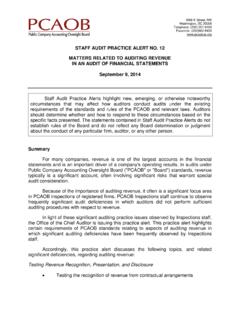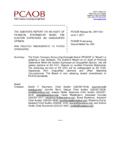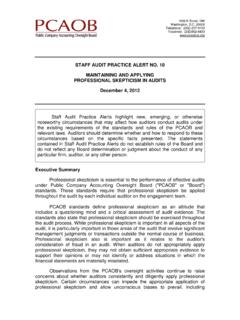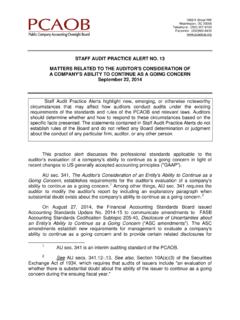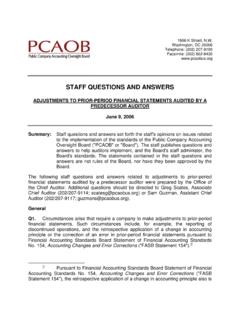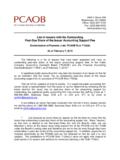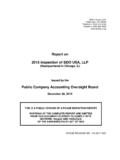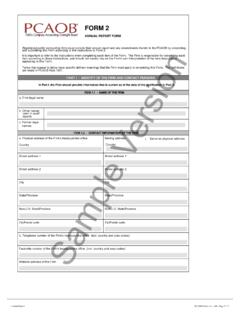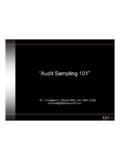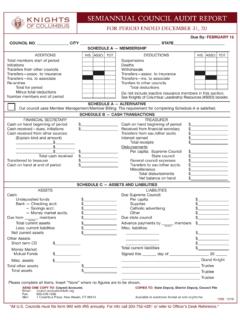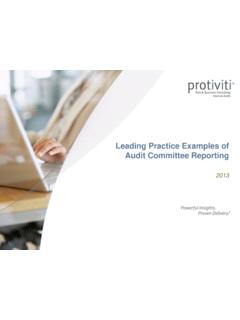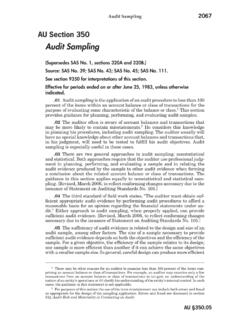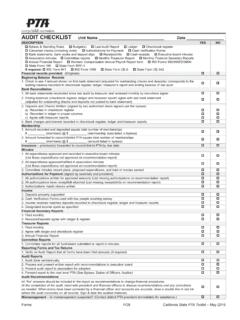Transcription of STAFF AUDIT PRACTICE ALERT NO 8 - pcaobus.org
1 1666 K Street, NW Washington, DC 20006 Telephone: (202) 207-9100 Facsimile: (202)862-8430 STAFF AUDIT PRACTICE ALERT NO. 12 MATTERS RELATED TO AUDITING REVENUE IN AN AUDIT OF FINANCIAL STATEMENTS September 9, 2014 STAFF AUDIT PRACTICE Alerts highlight new, emerging, or otherwise noteworthy circumstances that may affect how auditors conduct audits under the existing requirements of the standards and rules of the PCAOB and relevant laws. Auditors should determine whether and how to respond to these circumstances based on the specific facts presented. The statements contained in STAFF AUDIT PRACTICE Alerts do not establish rules of the Board and do not reflect any Board determination or judgment about the conduct of any particular firm, auditor, or any other person.
2 Summary For many companies, revenue is one of the largest accounts in the financial statements and is an important driver of a company's operating results. In audits under Public Company Accounting Oversight Board ("PCAOB" or "Board") standards, revenue typically is a significant account, often involving significant risks that warrant special AUDIT consideration. Because of the importance of auditing revenue, it often is a significant focus area in PCAOB inspections of registered firms. PCAOB Inspections STAFF continue to observe frequently significant AUDIT deficiencies in which auditors did not perform sufficient auditing procedures with respect to revenue.
3 In light of these significant auditing PRACTICE issues observed by Inspections STAFF , the Office of the Chief Auditor is issuing this PRACTICE ALERT . This PRACTICE ALERT highlights certain requirements of PCAOB standards relating to aspects of auditing revenue in which significant auditing deficiencies have been frequently observed by Inspections STAFF . Accordingly, this PRACTICE ALERT discusses the following topics, and related significant deficiencies, regarding auditing revenue: Testing Revenue Recognition, Presentation, and Disclosure Testing the recognition of revenue from contractual arrangements STAFF AUDIT PRACTICE ALERT No.
4 12 September 9, 2014 Page 2 Evaluating the presentation of revenue gross versus net revenue Testing whether revenue was recognized in the correct period Evaluating whether the financial statements include the required disclosures regarding revenue Other Aspects of Testing Revenue Responding to risks of material misstatement due to fraud ("fraud risks") associated with revenue Testing and evaluating controls over revenue Applying AUDIT sampling procedures to test revenue Performing substantive analytical procedures to test revenue Testing revenue in companies with multiple locations Auditors should take note of the matters discussed in this PRACTICE ALERT in planning and performing AUDIT procedures over revenue.
5 AUDIT firms should also revisit their AUDIT methodologies, and their implementation of those methodologies, to assure that PCAOB auditing standards are followed in the area of auditing revenue. In addition, AUDIT firms should consider whether additional training of their auditing personnel or other steps are needed to assure that PCAOB standards are followed. Because of the nature and importance of the matters covered in this PRACTICE ALERT , it is particularly important for the engagement partner and senior engagement team members to take action to ensure that engagement teams appropriately implement the auditing standards in these areas throughout the AUDIT and for engagement quality reviewers to focus on these matters when conducting their engagement quality reviews.
6 Due to the significance of revenue to many companies' financial and operating results, auditing revenue also raises matters of potential interest to AUDIT committees. AUDIT committees might wish to discuss with their auditors their approach to auditing revenue, including the matters addressed in this ALERT . On May 28, 2014, the Financial Accounting Standards Board ("FASB") and the International Accounting Standards Board jointly adopted a converged accounting standard on revenue recognition. The new accounting standard applies to any entity that either enters into contracts with customers to transfer goods or services or enters into contracts for the transfer of nonfinancial assets, unless the contracts are within the scope of other standards (for example, insurance contracts or lease contracts are within the scope of other standards).
7 The effective date of the new accounting STAFF AUDIT PRACTICE ALERT No. 12 September 9, 2014 Page 3 standard for public companies reporting under generally accepted accounting principles (" GAAP") is annual reporting periods beginning after December 15, 2016, including interim periods within that reporting period. The effective date of the new accounting standard for companies reporting under International Financial Reporting Standards ("IFRS") is on or after January 1, 2017. Early adoption is permitted for companies that report under IFRS but not for public companies that report under GAAP.
8 The Board's STAFF believes that the auditing matters discussed in this PRACTICE ALERT are likely to continue to have relevance to auditing revenue under the new accounting standard. STAFF AUDIT PRACTICE ALERT No. 12 September 9, 2014 Page 4 Introduction For many companies, revenue is one of the largest accounts in the financial statements and is an important driver of a company's operating results. In audits performed in accordance with PCAOB standards, revenue typically is a significant account, often involving significant risks that warrant special AUDIT For example, PCAOB standards require auditors to presume that improper revenue recognition is a fraud risk, a type of significant Historically, many fraudulent financial reporting cases have involved intentional misstatement of revenue.
9 For example, according to a study published by the Committee of Sponsoring Organizations of the Treadway Commission ("COSO Study"),3 which is based upon information disclosed by the Securities and Exchange Commission in accounting and auditing enforcement releases over a ten-year period, 61 percent of the 347 companies cited in such releases recorded revenue inappropriately, primarily by creating fictitious revenue transactions or by recording revenue The study identified improper revenue recognition as the most common method used to report fraudulent financial statement Similarly, the PCAOB has settled disciplinary orders against auditors for violating PCAOB rules and standards in an AUDIT .
10 Including violations involving failing to: (1) adequately address signs of improperly recognized revenue in significant unusual transactions; (2) sufficiently AUDIT estimates regarding revenue, including sales returns; (3) adequately address contradictory evidence when auditing revenue; and (4) evaluate or sufficiently evaluate whether revenue was properly disclosed in the financial 1 See paragraph 68 of Auditing Standard No. 12, Identifying and Assessing Risks of Material Misstatement. 2 See id. 3 See Mark S. Beasley, Joseph V. Carcello, Dana R. Hermanson, and Terry L. Neal, Fraudulent Financial Reporting 1998 2007: An Analysis of Public Companies, COSO (May 2010), available at 4 Id.
